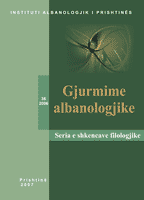PARIMET EPISTEMOLOGJIKE NË VEPRËN “SKËNDERBEU” TË FRANG BARDHIT
EPISTEMOLOGICAL PRINCIPLES IN THE WORK “SKËNDERBEU” BY FRANG BARDHI
Author(s): Arben HoxhaSubject(s): Cultural history
Published by: Instituti Albanologjik i Prishtinës
Keywords: EPISTEMOLOGICAL PRINCIPLES ; “SKËNDERBEU” ; FRANG BARDHI
Summary/Abstract: While concepts and ways of thinking for a man and his role in the world in various periods of development of human knowledge constituted implicit system of his vision towards the world, visions towards the world have represented explicit way of thinking about the world of thinking, about the position of man in it. Viewed this issue in such a context we can conclude that the work “Skënderbeu” by Frang Bardhi could be rightly understood only if it is viewed within and as a component part of system of thinking of the renaissance and humanism period. For the reason that in this period in the centre of thinking system will be man and the truth about him, it is clear that the starting point and the objective of his fight of thinking, Frang Bardhi would have two fundamental pillars of empirical-scientific thinking system, as one of modalities of human knowledge. Harshness and grandiosity of the battle fought by Frang Bardhi through his work “Skënderbeu” against his opponent Joan Tomk, is not determined from implementation of logical categories of various systems of thinking of his opponent, but from the different contents that are formed by the same modality of knowledge as a consequence of usage of the same categories within different logical modalities. Battles for the truth get their meaning when they are fought within boundaries of the same modality of knowledge. This way only, the battle of Frang Bardhi is functionalised in its meaning yesterday, and only as such it emits reasoning (rationality) and necessity to continue the fight for justice and humanism today, as well.
Journal: Gjurmime Albanologjike - Seria e shkencave filologjike
- Issue Year: 2006
- Issue No: 36
- Page Range: 085-091
- Page Count: 7
- Language: Albanian
- Content File-PDF

